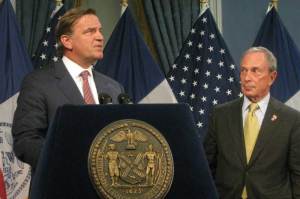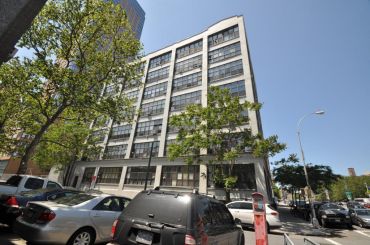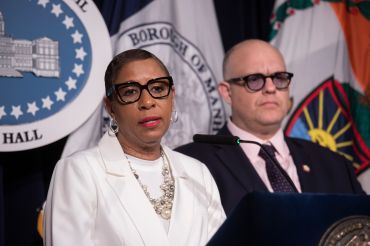 About three weeks ago, Bob Lieber, the outgoing deputy mayor for who has overseen the Bloomberg administration’s economic development strategy for the past two and a half years, placed a call to Robert Steel. Mr. Lieber was on the hunt for someone to fill his job-he’s leaving to work for real estate investor Andrew Farkas-and wanted to see if Mr. Steel, the former CEO of Wachovia and a deputy to Hank Paulson at Treasury, was up for the gig.
About three weeks ago, Bob Lieber, the outgoing deputy mayor for who has overseen the Bloomberg administration’s economic development strategy for the past two and a half years, placed a call to Robert Steel. Mr. Lieber was on the hunt for someone to fill his job-he’s leaving to work for real estate investor Andrew Farkas-and wanted to see if Mr. Steel, the former CEO of Wachovia and a deputy to Hank Paulson at Treasury, was up for the gig.
So Mr. Steel, who helped the city with a 2007 report that called for different and looser financial regulation, came down to the west wing of City Hall to chat. Then he met with the mayor.
And by Tuesday, everything was square away. The mayor announced the hire in City Hall’s Blue Room, as Mr. Steel stood by, examining the room as the mayor spoke.
To many politicians, now is not the most opportune time to bring in someone whose roots are deep in the financial world. The public has an aversion to any talk of banker profits, and the reputation of Goldman Sachs-where Mr. Steel was a vice chairman-polls at a fraction of that of an unpopular Congress.
Mayor Bloomberg, by contrast, has shown no inhibitions about embracing the financial industry with open arms, and his tapping Wall Street for a top deputy from is only his latest move.
In the of spring 2009, when the economy hit its nadir-just as the banks were dipping to their all-time lows and even those within the financial industry were predicting a neutered recovery on Wall Street-Bloomberg administration officials took to preaching the sector’s rosy return.
(“I’m very bullish about financial services.” Mr. Lieber told construction executives in April 2009, sounding at the time like he was talking about a different economy.)
And in the ongoing financial regulatory reform talks, the mayor has taken an upfront public position lambasting the industry’s critics in Congress in an attempt to stave off injurious regulation.
(While the mayor is simply trying to play hometown hero, it should be noted that his personal net worth depends on the success of Wall Street, since it is in large part tied to his financial information services company).
Politically, Mr. Steel’s hiring marks the arrival of another in a string of outside faces who will work close by the mayor. At the end of April, longtime aide Ed Skyler was replaced by Stephen Goldsmith, a former mayor of Indianapolis who won plaudits for innovative market-driven municipal governing practices and was a main policy mind behind the compassionate conservatism in George W. Bush’s 2000 presidential campaign.
With Mr. Steel joining Mr. Goldsmith, there are now two officials under Mayor Bloomberg who worked in the Bush administration, and, a corresponding new Republican tint to City Hall.
Then again, the mayor went the other way with the other deputy mayor he recently hired. Howard Wolfson has been a longtime Democratic operative, working for many of the more prominent Democrats in the city.
In his brief appearance before reporters Tuesday afternoon, Mr. Steel did not touch much on the financial industry. Delivering his remarks with a subtle Southern accent-he hails from North Carolina-he instead took time to call for an economic development strategy that would “strengthen the city’s historically strong industries, while also finding new ways to attract the kinds of businesses and industries that will be so important as the economy continues to change and evolve as we continue to move into the 21st century.
“A big part of that work will be finding new ways to support and encourage small businesses,” he added, “and help them create good, middle class jobs, and we’re going to do that in every borough and every neighborhood in the city.”


